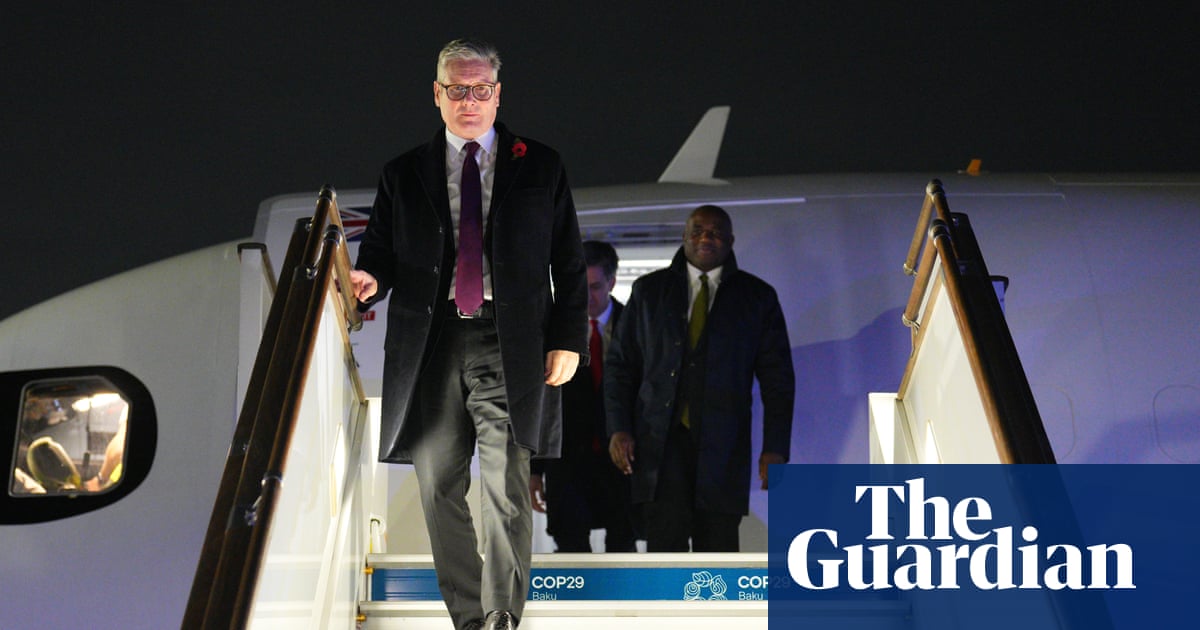Keir Starmer will announce a stringent new climate goal for the UK on Tuesday, the Guardian can reveal, with a target in line with the advice given to the government by its scientists and independent advisers.
The UK will pledge to cut emissions by 81% compared with 1990 levels by 2035, a target in line with the recommendations of the Climate Change Committee, according to three people familiar with the matter.
The goal will be one of the first national plans on cutting carbon, known as “nationally determined contributions” or NDCs in UN jargon, to be unveiled at Cop29, the crucial UN climate summit taking place in Azerbaijan this week, and is expected to be one of the most ambitious of any government at the talks.
The goal would be achieved by decarbonising the power sector and through a massive expansion of offshore wind, as well as through investments in carbon capture and storage and nuclear energy.
The UK is one of the first countries to announce an NDC, which are not due until February next year. Campaigners have found the NDCs submitted so far “underwhelming”. The NDC submitted by the previous Cop host, the United Arab Emirates, was described as “greenwashing” by 350.org. A submission by the next host, Brazil, was also criticised for being insufficient and called “misaligned” by Climate Observatory.
Friends of the Earth’s head of campaigns, Rosie Downes, said: “With the warning signals flashing red, a planet battered by increasingly severe floods, storms and heatwaves, and the election of climate denier President Trump, the need for climate leadership by the UK has never been more urgent. Starmer’s 2035 carbon-reduction pledge is a step in the right direction but must be seen as a floor to the level of ambition, not a ceiling. Deeper, faster cuts are needed to help avert the climate collision course we are on.
“Furthermore, if these targets are to be credible, they must be backed by a clear plan to ensure they are met. The UK’s existing 2030 commitment is currently way off course.”
On Monday, the World Meteorological Organization followed the EU space programme in saying 2024 was on track to become the hottest year on record.
Few big countries have yet come up with NDCs. The Cop29 talks opened on Monday, but will ratchet up a gear on Tuesday when scores of heads of state and government fly in from around the world.
Giorgia Meloni, the prime minister of Italy, Recep Tayyip Erdoğan, the president of Turkey and Mohammed bin Salman, the crown prince of Saudi Arabia, are among the other leaders attending. Joe Biden of the US, Xi Jinping of China, Olaf Scholz of Germany and Emmanuel Macron of France will not be at the talks, with the latter two preoccupied by domestic political crises.
On Monday, delegates heard stark warnings from the UN climate chief, Simon Stiell, and the Cop president and Azerbaijani environment minister, Mukhtar Babayev, urging countries to step up with strong commitments on the climate before it is too late.
This summit, at which nearly 200 countries are expected to be represented, will focus on climate finance – ways of getting poor countries access to the money they need to cut their greenhouse gas emissions and adapt to the impacts of extreme weather.
About $1tn (£780bn) is expected to be needed each year by 2035, but developed countries have agreed to ensure only $100bn a year from public funds.
after newsletter promotion
The host country claimed an early win in the talks by signing off on a deal intended to make carbon offsets work for the planet, and as a source of cash for poor countries.
Diplomats have given the green light to rules that govern the trade of “carbon credits”, breaking a deadlock that has lasted years and paving the way for rich countries to pay for cheap climate action abroad while delaying expensive emission cuts at home. But critics warned the rules were rushed through without following proper process.
Carbon offsets, or carbon credits, are awarded to countries with large forests that absorb carbon dioxide from the atmosphere, or to projects that reduce greenhouse gas emissions, such as wind or solar farms. Selling them should be a source of cash for the developing world, but years of argument over how exactly such a system would work have prevented the widespread uptake of trading systems.
The beginnings of a potential system for trading were set out in article 6 of the Paris climate agreement in 2015, but countries have struggled to put the idea into practice, owing to disagreements over technical issues, such as how to avoid double counting, and ideological differences, as some countries are wary of using carbon offsets.
Azerbaijan hopes the progress on article 6 will clear the way for more substantive talks, for the rest of the scheduled fortnight, on a goal of making $1tn a year in climate finance available to poorer countries by 2035.
However, many civil society groups remain concerned about article 6. Erika Lennon, an attorney at the Center for International Environmental Law, said: “We’ve seen over and over again how carbon markets are not doing what they claim to be doing, as well as market projects that violate people’s rights. If they don’t have strong rules in place to prevent all of the abuses, it can totally undermine the integrity of the Paris agreement.”

